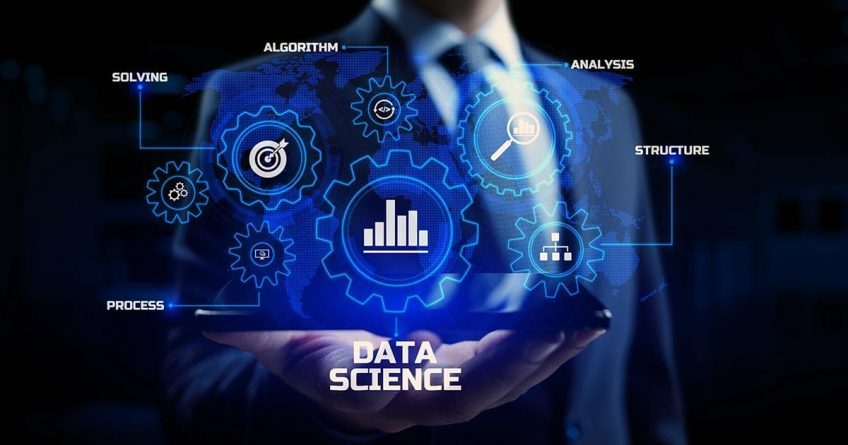Data science is one of the highest professions for skills. Data scientists are sought after for their data taming and insight-generating abilities. The discipline presents an enticing career path for the analytically-minded.
While data scientists start their careers via many different pathways, there are core data science skills that you’ll need to develop. If you’re curious about the top skills for a data science career, this list of hard and soft skills is a great start. At the end, we identify the best skills for a junior data scientist to learn.
Hard Skills for Data Science

The hard skills required of a data scientist include mathematics, especially statistics and regression analysis, the ability to program, skill in transforming raw data into usable formats, and knowing to present data insights visually. As well, it’s beneficial to understand machine learning techniques, how natural language processing is performed, and be able to handle the analysis and management of big data.
1. Statistics and mathematics
Data scientists regularly use statistical and mathematical techniques in their data analysis work. A firm grounding in statistics and math is a fundamental data science skill.
You should be familiar with standard deviation, distribution curves, variance, probability, and statistical modelling and analysis. Likewise, top candidates benefit from past exposure to linear algebra, multivariable calculus, and similar mathematical concepts.
When you Google for the math requirements for data science, the three topics that consistently come up are calculus, linear algebra, and statistics. The good news is that — for most data science positions — the only kind of math you need to become intimately familiar with is statistics.
Flatiron School
Mathematical ability is, however, notionally more important than being strong in specific areas connected with data science practice. If you’re good at math and have taken plenty of mathematics subjects before, you’re well positioned. You can quickly refresh or study certain topics as required by the daily demands of your data scientist job.
2. Programming
While data scientists typically aren’t software engineering experts, their work requires coding ability – particularly when cleaning messy datasets – and other computer science skills. As part of your responsibilities, you may need competency in code version control using tools like GitHub and Git.
The entire Data Science field is moving quickly towards Software Engineering and increasingly focusing on coding skills. As a result, it would be extremely difficult to get a DS job without a strong background in coding.
Leihua Ye
Even with AI taking over coding tasks, programming skill and knowledge is still need to direct AI well. According to Kaggle, Python is the most common programming language used, followed by SQL and R. Other programming languages you may encounter include C, C++, C#, Java, and Julia.
Related: How AI and Data Science Evolve Together
3. Regression analysis
A core skill for the data scientist is the ability to do regression analysis. When you run a regression, you establish how well a set of independent variables combine to predict the value of the dependent variable. For example, using a simple linear model (y = a + b * x), you might see how well the daily temperature for a city (x) predicts the amount of ice-cream purchased (y).
Businesses, economists and data scientists are all interested in the results of regression analysis. For a data scientist, running regressions uncovers which known variables are most useful for predicting the dependent variable.
You’ll typically use these models for linear relationships between variables, and the insights that can prove helpful for business purposes. Fluency in logistic regression is an added advantage, building on basic regression skills and allowing for greater flexibility in analysing data sets.
4. Data wrangling
Data wrangling refers to data manipulation activities that help transform data from one format to another, especially converting unstructured data into usable forms. Other terms for it are data cleaning, data remediation and data munging.
Raw data may contain errors, inconsistencies and outliers that make a dataset initially unusable. By inspecting the data and writing transformation and filtering algorithms, you can overcome these deficiencies.
Data wrangling is the process of cleaning and unifying messy and complex data sets for easy access and analysis… This process typically includes manually converting and mapping data from one raw form into another format to allow for more convenient consumption.
Altair
Data wrangling supports and complements database design and management and ultimately allows you to build models and perform deep data analysis. A data scientist should also be skilled at feature engineering, a process to transform raw data into usable features (properties, characteristics, attributes) for machine learning.
5. Data visualization
Presenting data visually helps the data scientist understand patterns in the data better. The practice is also useful as a way to play with data and make discoveries. Expertise with data visualization software and techniques is also vital to showcase the facts you’ve unearthed. After all, data insights are useless if you cannot communicate them.
Tableau and Power BI are standard data visualization tools you should be good at using. It also helps if you know how to present data using multiple formats such as bar charts, pie charts, scatter plots, heat maps, line graphs, and more. You can use free software such as Google Charts and basic versions of Infogram and Microsoft Power BI to generate diagrams.
Building data visualization skills is really just a matter of practice. You can grab some data and try different software to produce visuals that are uncluttered and tell a story quickly. See what other data scientists are doing and keep practising your craft.
6. Machine learning
Machine learning (ML) is at the heart of data science’s most impactful results, from speech recognition to Netflix’s recommendation engine. All data scientists should have some familiarity with how to build a machine learning model, though you may not use your skills on a day-to-day basis. If you’re eager to get involved in machine learning, a good foundation in ML modelling is a must.
The machine learns on its own through machine learning algorithms – but how? Who gives the necessary inputs to a machine for creating algorithms and models? No points for guessing that it is data science.
Ramya Shankar
To make machine learning happen, you’ll need core data science skills plus the ability to produce models and algorithms that direct the learning process. Some of the competencies data scientists need for ML are knowledge of K-nearest neighbour, random forests, decision trees and K-means clustering. Deep learning is an advanced sub-field based on artificial neural networks.
7. Big data tools and servers
Big data presents some of the most exciting opportunities for companies. Many of the essential data scientist skills can be employed equally as well for large datasets as small ones. However. you’ll need some extra capabilities to handle the large datasets themselves.
Contributing to this vertical requires an aptitude for big data analytical tools like Hadoop, Spark and MapReduce. Exploiting massive data assets also demands expert-level familiarity with cloud ecosystems like Azure, Amazon Web Services (AWS), Google Cloud or IBM Cloud.
8. Natural language processing
If you prefer a career path that focuses on human-machine interaction, proficiency in natural language processing will be important. NLP is a sub-field of data science that’s connected with machine learning and artificial intelligence. NLP allows machines to comprehend human language and also communicate to us in our own languages.
When working in this discipline, you’ll employ most of the tools and competencies already listed above. But your work will tend towards understanding and producing algorithms to recognise and correctly interpret human text and speech.
NLP is important for data scientists to know, at least at a foundational level, because it promises to have a major impact on all our lives. Alexa and Siri, for example, are automatic translators in widespread use. A good data scientist should have at least a passing interest in NLP techniques such as lemmatization, stemming, keyword extraction, topic modelling and sentiment analysis.
Soft Skills for Data Science

Soft skills are the non-technical skills that are difficult to learn from a textbook or computer science course. They need to be cultivated for a data scientist to have impact in the workplace and enjoy a successful career. Here are key soft skills for data scientists to develop.
9. Problem-solving
Successful data scientists, from junior data scientists to experienced pros, love solving problems and relish the challenge of complex data questions. But keep in mind that the issues you’ll tackle aren’t merely theoretical; they will have real world implications that drive business results.
Top data scientists bring a solution-oriented approach to the role. You’re not there to simply solve interesting questions; you’re unearthing data insights that could change a business profoundly.
Pan Wu describes a problem-solving approach which illustrates how the job of a data scientist is to bring mathematical rigor to real-world issues. Generating a business solution has three stages: (1) Understand the problem and define it in mathematical terms (2) Decompose the problem, construct an algorithm solution and build it out and (3) Re-think the problem and solution in a business context to potentially generate non-incremental improvements.
10. Critical thinking
Critical thinking is pivotal to problem-solving, which is why it’s one of the top data science skills. You’ll routinely encounter questions that force you to analyse problems, see all the angles objectively, and reason analytically, all of which are central tenets of critical thinking.
Lateral thinking is perhaps a more apt term when it comes to challenges faced by data scientists. While one may be well trained in solving abstract problems or writing algorithms, thinking outside the box often counts more in terms of results. The non-obvious can easily make or break a project.
Rahul Agarwal identifies five business-orientated critical thinking skills: (1) re-check for data flaws that make your nice-looking datasets unclean (2) connect the business to the data clearly in your own mind to understand the data better (3) thoughtfully choose performance metrics for the particular case (4) be sceptical of high-level statistical findings and (5) be careful of simplifications and try to look deeper at data patterns.
11. Storytelling
Storytelling aids data scientists in communicating data insights clearly and logically. It adds context and weight to data results, helping decision-makers appreciate your perspective and the implications of the results.
Storytelling creates a narrative to make data results easier to understand. Don’t be surprised if decision-makers decide to ignore your findings after a data insights presentation that they don’t properly understand. Without a good story and examples, they may not trust your findings or be able to communicate them well to anyone else.
If you want people to make the right decisions with data, you have to get in their head in a way they understand. Throughout human history, the way to do that has been with stories.
Miro Kazakoff
Your work must be relatable for you to be an effective data scientist. Work on messaging, simplifying logic and producing attractive visuals. Also, practice getting in the heads of your audience. Some may be experts but others may not be fluent in the language of mathematics and statistics.
12. Communication
As with all professional roles that involve collaboration with others, good communication skills are a basic requirement for a career in data science. In fact, great communication is often one of the best indicators of workplace excellence according to Google.
We’ve already mentioned a few of the key communication skills for a data scientist, namely data visualisation and storytelling. We can throw in some others such as business insight, presentation skills, writing, listening to stakeholders and social media.
You should be able to convey your thoughts clearly, whether in written or spoken communication. Documentation and reporting are routine tasks in data science and doing them well requires excellent communication skills.
13. Data intuition
Data intuition is the ability to instinctively recognise patterns and stand out features in data sets. Patterns may not always be readily apparent, so skilled data scientists know what to look for during exploratory data analysis or data mining.
While learning machine learning algorithms are essential, data intuition is the most critical skill for a data scientist. If one does not know a data science technique, he or she can always learn it, but data intuition cannot be acquired in a few days.
Sanjiv Kumar Jha
An intuitive feel for data patterns might not be easily obtainable for newbies, often coming from great familiarity and experience with various data types. Thankfully, you can polish the skill by attending data science bootcamps and you’ll naturally improve over time.
14. Intellectual curiosity
Intellectual curiosity is the drive to find answers, even when they may not be apparent or easily extracted. Data scientists with intellectual curiosity are willing to entertain innovative ideas, challenge the status quo, and pursue results using creative methods.
The field requires tenacity, problem solving, and grit to dig into the details and realize that most projects are never really finished, but constantly evolving as we uncover more information.
Catie Williams
Data science is about uncovering hidden truths and unearthing the most important secrets within data. The best data scientists don’t accept “just enough” but are committed to finding complete and valuable answers.
15. Collaboration
While data scientists have a reputation for being lone rangers, the ability to freely collaborate as required is an essential trait for success. This is a good soft skill to include on your data science skills resume. You can make yourself stand out by impressing people with openness, friendliness and willingness to make professional connections.
In your work, you’ll have to interact meaningfully with other data science professionals and non-technical colleagues within and outside your direct duties. So, you must recognise the importance of teamwork and actively seek and appreciate other team members’ input.
Skills Required for a Junior Data Scientist

Building up all the skills on this list takes time. Maybe you’re wondering about the essential skills for a junior data scientist, who is just starting out in data analytics.
To establish the technical skills required, we examined the subjects students take in a Graduate Certificate in Data Science. This is a 4-subject postgraduate course that provides the foundational training to get you started on a data science career.
Common skills initially taught to data scientists in-training are:
- Data science foundations (an overview of data science as a discipline as well as an introduction to key topics)
- Statistical methods for data science (probability distribution foundations for regression analysis and multivariate analysis)
- Database systems (skills and tools to create and use a database system using SQL)
- Data visualization (design approaches and techniques of data visualization using Tableau)
- Programming principles (an introduction to programming in Python, covering data structures and algorithms, debugging and testing, and simulation).
In writing this list of skills required to be a data scientist, even just a junior one, we noticed that the breadth of skills is large and somewhat daunting. But we were also reminded of a few factors from which you can take comfort from when learning to become a data scientist.
You can start with foundation skills and become at least a little familiar with each sub-field quite quickly. If you do an extended data science course, such as a Master of Data Science, you’ll build expertise across all major areas you need to cover. And, when working as a data scientist, specialization is common into different kinds of data science jobs. So, you can focus on a limited range of professional skills at any given time.


Dave
What about emotional intelligence? Understanding your team and stakeholders is key to getting your data insights implemented.
Lerna Courses
Good point. EI goes beyond understanding people, and is maybe too large to include as a specific skill on your resume. It covers managing your own emotions, empathising with others, and handling social complexities. It also takes in self-awareness, self-regulation, and strong interpersonal skills.
Josh
This article is very helpful and gives a fine idea about where you stand right now on the way to becoming a data scientist. Turns out, I’m not at par. Am motivated and inspired to work harder and check all the points on this list asap.
Dan
This article really helped me decide on my path for higher education. I was torn about whether to go back and learn a new skill or set of skills, and this opened my eyes to the job opportunities available in data science. It would obviously be difficult to learn everything all at once, so you also need to be adaptible and willing to learn as you go.